
 |
|
The Missing (2003) Cast: Cate Blanchett, Tommy Lee Jones, Jenna Boyd, Evan Rachel Wood, Eric Schweig, Aaron Eckhart, Val Kilmer, Jay Tavare, Elisabeth Moss, Simon Baker, Sergio Calderon, Clint Howard, Rance Howard, Ray McKinnon, Yolanda Nez 2003 – 130 minutes Rated: Reviewed by Dustin Putman, November 29, 2003.  It is no secret that the western genre has been ailing for over a decade, not helped by the very weak offerings that have popped up in recent years—2001's "American Outlaws," 2001's "Texas Rangers," and 2003's "Open Range" among them. That "The Missing," directed with evocative style by Ron Howard (2001's "A Beautiful Mind"), effectively tells a story that keeps our attention instantly places it several notches above the sloppy and dull former films. Too bad, then, that "The Missing" overstays its welcome by at least fifteen minutes.
It is no secret that the western genre has been ailing for over a decade, not helped by the very weak offerings that have popped up in recent years—2001's "American Outlaws," 2001's "Texas Rangers," and 2003's "Open Range" among them. That "The Missing," directed with evocative style by Ron Howard (2001's "A Beautiful Mind"), effectively tells a story that keeps our attention instantly places it several notches above the sloppy and dull former films. Too bad, then, that "The Missing" overstays its welcome by at least fifteen minutes.
 Maggie Gilkeson (Cate Blanchett) is a single mother living on the sparsely populated open lands of the New Mexico frontier, circa 1885. When her lover, Brake Baldwin (Aaron Eckhart), is brutally murdered and mopey teenage daughter, Lilly (Evan Rachel Wood), is kidnapped by a dangerous Aztec mystic named Chidin (Eric Schweiger) who plans to sell her over the Mexican border, Maggie will go to any length necessary to save her. Those lengths turn out to be more painful than expected, however, as she must seek help from her estranged father, Samuel Jones (Tommy Lee Jones), who abandoned her family twenty years earlier to become an Indian. With tough younger daughter, Dot (Jenna Boyd), in tow, Maggie and Samuel set out on a trek across New Mexico to put a stop to Chidin and save Lilly before it is too late.
Maggie Gilkeson (Cate Blanchett) is a single mother living on the sparsely populated open lands of the New Mexico frontier, circa 1885. When her lover, Brake Baldwin (Aaron Eckhart), is brutally murdered and mopey teenage daughter, Lilly (Evan Rachel Wood), is kidnapped by a dangerous Aztec mystic named Chidin (Eric Schweiger) who plans to sell her over the Mexican border, Maggie will go to any length necessary to save her. Those lengths turn out to be more painful than expected, however, as she must seek help from her estranged father, Samuel Jones (Tommy Lee Jones), who abandoned her family twenty years earlier to become an Indian. With tough younger daughter, Dot (Jenna Boyd), in tow, Maggie and Samuel set out on a trek across New Mexico to put a stop to Chidin and save Lilly before it is too late.
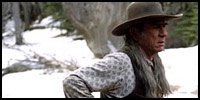 The prerelease ads and trailers for "The Missing" have misleadingly billed it as more of a supernatural thriller than a conventional western. If you can get past the fact that its supernatural elements are basically beside the point and its thriller aspect only comes from the horror involved in a mother losing her daughter to what are essentially a group of pimps, what you will find is a western adventure that may not be terribly original, but hits enough involving emotional chords to be worthwhile. The setup of the driving plot is its highlight section, as Maggie suddenly finds herself having lost a loved one and must risk losing Lilly, too, if she does not find a way to find her before the captors reach Mexico. The atmosphere-drenched cinematography, by Salvatore Totino (2002's "Changing Lanes"), is simply glorious, painting the untouched soils of the New Mexico forests and canyons as a rapturous character in and of themselves.
The prerelease ads and trailers for "The Missing" have misleadingly billed it as more of a supernatural thriller than a conventional western. If you can get past the fact that its supernatural elements are basically beside the point and its thriller aspect only comes from the horror involved in a mother losing her daughter to what are essentially a group of pimps, what you will find is a western adventure that may not be terribly original, but hits enough involving emotional chords to be worthwhile. The setup of the driving plot is its highlight section, as Maggie suddenly finds herself having lost a loved one and must risk losing Lilly, too, if she does not find a way to find her before the captors reach Mexico. The atmosphere-drenched cinematography, by Salvatore Totino (2002's "Changing Lanes"), is simply glorious, painting the untouched soils of the New Mexico forests and canyons as a rapturous character in and of themselves.
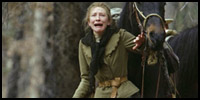 Cate Blanchett (2001's "The Shipping News") brings a fierce energy and reluctant vulnerability to her role of Maggie Gilkeson, who not only suffers the blow of having her daughter snatched from her, but is reunited with a father who abandoned her years ago and whom she has no interest in rekindling a relationship with. The anger and resentment Blanchett projects toward Samuel is palpably felt throughout, and the way in which they gradually attempt to put their differences behind them is the true centerpiece of the picture. Tommy Lee Jones (2003's "The Hunted") skillfully portrays Samuel as a man who gave up his family to become what he felt was right for himself, but now, years later, feels guilt over what he put his family through.
Cate Blanchett (2001's "The Shipping News") brings a fierce energy and reluctant vulnerability to her role of Maggie Gilkeson, who not only suffers the blow of having her daughter snatched from her, but is reunited with a father who abandoned her years ago and whom she has no interest in rekindling a relationship with. The anger and resentment Blanchett projects toward Samuel is palpably felt throughout, and the way in which they gradually attempt to put their differences behind them is the true centerpiece of the picture. Tommy Lee Jones (2003's "The Hunted") skillfully portrays Samuel as a man who gave up his family to become what he felt was right for himself, but now, years later, feels guilt over what he put his family through.
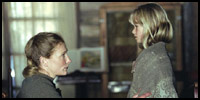 Jenna Boyd (2003's "Dickie Roberts: Former Child Star") brings mature conviction to her impressive performance as Maggie's younger daughter, Dot, while Evan Rachel Wood (remarkable in 2003's "Thirteen") has less to do as Lilly, mostly seen as the helpless victim throughout the picture. Finally, as lead villain Chidin, Eric Schweiger makes for a memorably threatening, even scary, presence.
Jenna Boyd (2003's "Dickie Roberts: Former Child Star") brings mature conviction to her impressive performance as Maggie's younger daughter, Dot, while Evan Rachel Wood (remarkable in 2003's "Thirteen") has less to do as Lilly, mostly seen as the helpless victim throughout the picture. Finally, as lead villain Chidin, Eric Schweiger makes for a memorably threatening, even scary, presence.
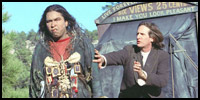 As "The Missing" passes the two-hour mark, interest ultimately begins to lag. The film breaks up its shoot-out climax into three separate sequences, each one less powerful than the last. Had Chidin been the only foe, rather than surrounded by a bunch of disposable henchmen, this problem may have easily been solved. After all, Chidin is the sole villainous character with any sort of consequence to the viewer. Other extraneous scenes also could have been cut in the second half without losing anything of real importance, while the very serious matter of Maggie's rape is too safely washed over and not touched upon again.
As "The Missing" passes the two-hour mark, interest ultimately begins to lag. The film breaks up its shoot-out climax into three separate sequences, each one less powerful than the last. Had Chidin been the only foe, rather than surrounded by a bunch of disposable henchmen, this problem may have easily been solved. After all, Chidin is the sole villainous character with any sort of consequence to the viewer. Other extraneous scenes also could have been cut in the second half without losing anything of real importance, while the very serious matter of Maggie's rape is too safely washed over and not touched upon again.
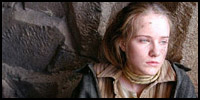 At 130 minutes, "The Missing" seems much longer than it even is. Staying with it throughout its slower patches, however, proves to be a mostly rewarding experience. Director Ron Howard appreciatively does away with the maudlin sentimentality many of his earlier films have fallen victim to, and he proves to adeptly know his way around the western genre. The final scene between Maggie and Samuel hits a particularly palpable note, concluding their troubled relationship with the right amount of emotional closure and understandable opened ends. "The Missing" may not be a standout western for modern day audiences, but it is undoubtedly a step in the right direction.
At 130 minutes, "The Missing" seems much longer than it even is. Staying with it throughout its slower patches, however, proves to be a mostly rewarding experience. Director Ron Howard appreciatively does away with the maudlin sentimentality many of his earlier films have fallen victim to, and he proves to adeptly know his way around the western genre. The final scene between Maggie and Samuel hits a particularly palpable note, concluding their troubled relationship with the right amount of emotional closure and understandable opened ends. "The Missing" may not be a standout western for modern day audiences, but it is undoubtedly a step in the right direction.
|
© 2003 by Dustin Putman |














